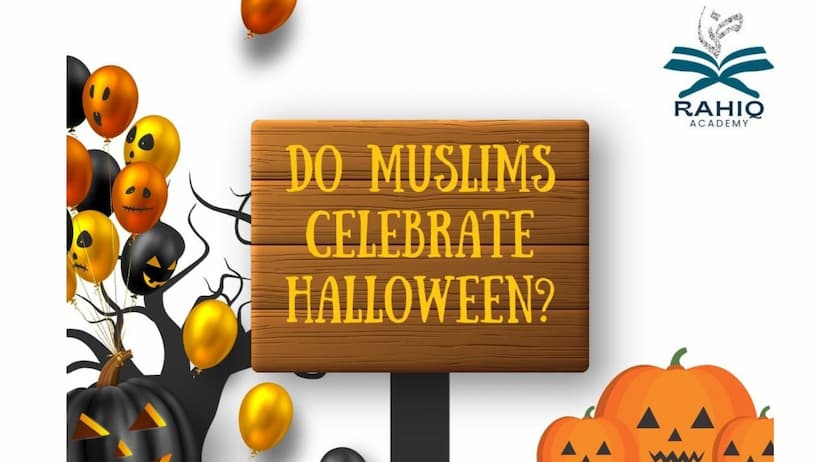As The Crisp Autumn Air Ushers In The Month Of October, The World Around Us Is Adorned With Pumpkins, Ghoulish Decorations, And An Air Of Festivity. Halloween, A Celebration That Has Transcended Its Origins And Captured The Imagination Of Many Cultures, Has Become A Global Phenomenon. However, For Muslims, The Question Of Whether To Participate In This Widely Observed Event Remains A Subject Of Contemplation And Debate.
In This Article, We Delve Into The Roots Of Halloween, Its Place Within Islamic Teachings, And answer the important question can a muslim Celebrate Halloween
Halloween’s Roots and Its Place in Islam

what is the Halloween’s Roots and Its Place in Islam?
The origins of Halloween can be traced back to the ancient Celtic festival of Samhain, celebrated on October 31st by the pagan Celts of Ireland, Scotland, and parts of Britain.
This festival marked the end of the harvest season and the beginning of the dark winter months.
The Celts believed that on this night, the boundaries between the living and the dead became blurred, allowing spirits to roam the earth. Druids, the Celtic priests, would build sacred bonfires and perform rituals to honor their deities, including the lord of the dead, Samhain.
The Celtic belief in wandering spirits during Samhain gave rise to various traditions and superstitions. People would wear costumes and masks to disguise themselves from the spirits, while others would leave food offerings on their doorsteps to appease the roaming souls. The practice of carving jack-o’-lanterns from turnips or gourds was also thought to ward off evil spirits.
With the advent of Christianity, the pagan festival of Samhain was later assimilated into the Christian celebration of All Hallows’ Eve, or All Saints’ Day, observed on November 1st.
This day was dedicated to remembering the saints and martyrs of the Christian faith. However, many of the traditional Celtic practices, such as wearing costumes, carving jack-o’-lanterns, and the belief in wandering spirits, were gradually incorporated into the modern-day celebration of Halloween.
From an Islamic perspective the pagan roots of Halloween raise concerns as they contradict the fundamental belief in Tawhid, the oneness of God.
Islam rejects the notion of multiple deities, spirits, or supernatural entities, as it is a monotheistic faith that upholds the worship of the One True God, Allah.
The Islamic concept of Tawhid is the foundation of the religion, and any practices that involve the veneration of other beings or entities are considered acts of shirk (associating partners with Allah), which is strictly prohibited.
Islamic Principles and Halloween
The Quran and the teachings of Prophet Muhammad (peace be upon him) provide clear guidance on avoiding practices rooted in falsehood, superstition, and the imitation of disbelievers. This principle is particularly relevant when considering customs like Halloween, which some Muslims view as incompatible with Islamic beliefs due to its contradiction between Islamic principles and Halloween
In the Quran, Allah says,
“وَالَّذِينَ لَا يَشْهَدُونَ الزُّورَ وَإِذَا مَرُّوا بِاللَّغْوِ مَرُّوا كِرَامًا” [25:72] “
And those who do not witness falsehood, and if they pass by some evil play or evil talk, they pass by it with dignity” [Surah Al-Furqan: 72].
This verse emphasizes the importance of distancing oneself from activities that involve falsehood or practices contrary to Islamic teachings.
Renowned Islamic scholars Opinions
Ibn Taymiyah
explicitly stated that Muslims should not attend or participate in the festivals of disbelievers, as they combine falsehood, physical desires, and practices that hold no religious benefit from an Islamic perspective. He cited the Quranic verse mentioned above as evidence against witnessing or participating in such celebrations.
Moreover, Ibn Taymiyah highlighted the conditions set by Umar ibn al-Khattab (may Allah be pleased with him) and agreed upon by the Companions of the Prophet (peace be upon him), which prohibited non-Muslims living under Islamic rule from openly celebrating their festivals. If the open celebration of non-Muslim festivals was prohibited, then it is even more impermissible for Muslims to participate in such celebrations, as it would be a greater transgression.
Ibn al-Qayyim
another prominent scholar, stated that there is a consensus among scholars that congratulating or greeting non-Muslims on their religious festivals is strictly prohibited, as it implies approval and acceptance of their rituals of disbelief. He likened this act to congratulating someone for committing grave sins, such as drinking wine or engaging in illicit sexual relations, as it suggests an endorsement of their actions.
Furthermore, the Prophet Muhammad (peace be upon him) emphasized the importance of differentiating between Muslims and disbelievers, stating, “Whoever imitates a people is one of them” (Abu Dawud). This hadith serves as a clear warning against adopting practices that are inherently linked to disbelief or that contradict Islamic teachings.
The Excitement of Halloween in Islam
While Halloween may be perceived as innocent fun, particularly for children who delight in dressing up and collecting treats, it is essential to consider The Excitement of Halloween in Islam and provide alternative activities that align with Islamic teachings and values.
One of the primary concerns surrounding Halloween is the potential for children to be exposed to practices and symbols that contradict Islamic beliefs. Dressing up as witches, ghosts, or other supernatural beings can inadvertently promote the belief in entities other than Allah, which is a form of shirk. Additionally, the emphasis on fear, darkness, and the celebration of death can be viewed as incompatible with the teachings of Islam, which promote peace, light, and the remembrance of Allah.
To address these concerns, many Muslim parents and communities strive to provide alternative activities and events that foster a sense of belonging and joy while upholding Islamic principles.
Instead of celebrating Halloween
Muslim communities often organize storytelling sessions
Storytelling sessions can feature narratives from the Quran, the life of Prophet Muhammad (peace be upon him), or the lives of righteous companions and scholars, instilling valuable lessons and virtues and gatherings that highlight Islamic traditions and promote knowledge about the faith.
Art activities
Art activities can involve creating Islamic calligraphy, geometric patterns, or crafts related to Islamic celebrations, fostering creativity while reinforcing Islamic identity
These events serve as educational platforms, allowing Muslim children to learn about the rich history and values of Islam in an engaging and enjoyable manner.
Parents responsibility
Furthermore, Muslim parents are encouraged to have open conversations with their children, explaining why certain practices, including Halloween, do not align with Islamic principles. By nurturing their children with knowledge from the Quran and the teachings of Prophet Muhammad (peace be upon him), parents can instill a deep love for Allah and an understanding of the importance of preserving Islamic identity.
Islamic celebrations
These conversations can also highlight the spiritual significance of Islamic celebrations, such as Ramadan and the two Eids (Eid al-Fitr and Eid al-Adha).
These events hold immense importance in the Islamic faith, promoting unity, spirituality, and the remembrance of Allah. By actively engaging in these celebrations and instilling their importance in their children, Muslim parents can effectively counter the allure of celebrations rooted in practices contrary to Islamic teachings.
Halloween Doesn’t Support A Good Muslim Character
While some may view Halloween as harmless entertainment, it is crucial to consider the potential negative impacts on one’s Islamic identity and character. Halloween doesn’t support a good muslim character
Celebrating or endorsing practices rooted in pagan beliefs and superstitions can weaken the foundations of faith and contradict the principles of Islam, which emphasize the pursuit of knowledge, moral excellence, and a strong connection with Allah.
The Prophet Muhammad (peace be upon him) emphasized the importance of differentiating between Muslims and disbelievers, stating, “Whoever imitates a people is one of them” (Abu Dawud).
This hadith serves as a reminder that adopting the practices of non-Muslims can inadvertently lead to the erosion of one’s Islamic identity and values. By participating in celebrations with pagan origins, Muslims may gradually become desensitized to practices that contradict their beliefs, potentially leading to a weakening of their faith and commitment to Islamic teachings.
Furthermore, participating in Halloween celebrations may send a conflicting message to non-Muslims, suggesting approval or endorsement of practices that contradict Islamic teachings. This can potentially create confusion and misunderstandings about the true nature of Islam, which is a religion of peace, unity, and submission to the One God, Allah.
Leading By Example
It is crucial for Muslims to lead by example, prioritizing spiritually significant events in Islam, such as Ramadan and the two Eids, which promote unity, spirituality, and the remembrance of Allah.
Ramadan
During Ramadan, for instance, Muslims are encouraged to practice self-restraint, self-discipline, and empathy for those less fortunate. The act of fasting teaches patience, humility, and the importance of detaching oneself from worldly desires. The nightly prayers (Taraweeh) and the recitation of the Quran during this month serve to strengthen one’s connection with Allah and foster a sense of spiritual renewal.
The two Eid celebrations
Similarly, the two Eid celebrations, Eid al-Fitr and Eid al-Adha, offer opportunities for Muslims to rejoice in their faith while reinforcing the values of unity, gratitude, and sacrifice. Eid al-Fitr marks the end of Ramadan and is a time for families and communities to come together in celebration, offering prayers and exchanging gifts. Eid al-Adha, on the other hand, commemorates the willingness
of Prophet Ibrahim (peace be upon him) to sacrifice his son in obedience to Allah’s command, reminding Muslims of the importance of submission and sacrifice in the path of Allah.
By actively participating in these Islamic celebrations and adhering to the teachings of the Quran and the Prophet Muhammad (peace be upon him), Muslims can cultivate a strong character rooted in faith, moral excellence, and a deep connection with their Creator.
This, in turn, will serve as a powerful deterrent against being swayed by practices that contradict Islamic principles, such as celebrating Halloween.
Moreover, by prioritizing Islamic events and values, Muslims can effectively counter the influence of cultural celebrations that may potentially undermine their religious identity.
Instead of feeling excluded or drawn towards practices that contradict their beliefs, Muslims can find fulfillment and joy in celebrating their own traditions, which are rich in meaning and spirituality.
Conclusion
In conclusion, while Halloween may hold an allure for many, its pagan roots and practices raise significant concerns from an Islamic perspective. The Quran, the teachings of Prophet Muhammad (peace be upon him), and the guidance of renowned Islamic scholars provide clear directives on avoiding falsehood, superstitions, and the imitation of disbelievers.
As Muslims, it is our responsibility to uphold the teachings of our faith and prioritize spiritually significant events that strengthen our connection with Allah and our community. By doing so, we can navigate the complexities of diverse cultural practices while remaining steadfast in our beliefs and values.
Want to take your Arabic and Quranic studies to the next level?
Explore our comprehensive Online Courses designed for all skill sets!
Visit our Website to learn more, book Your Free Evaluation and enroll today.




